Reviews
Lucas Reiner
USA, 1990
Credits
Review by David Carter
Posted on 13 August 2010
Source Warner Bros. DVD
Categories Favorites: Time Travel
The Spirit of ‘76 is a quaint time-travel comedy that drifted in and out of theaters unnoticed in 1990 only to frequently resurface later on basic cable. Unabashedly innocuous, Spirit is a quickly paced look at American culture in the seventies, but even removed from any sort of historical or cinematic context the film is a pleasing, but ultimately unmemorable diversion. Analyzing the film from the perspective of cultural and cinematic history gives one a far different view, however. Though I won’t argue that the film influenced any major change, The Spirit of ‘76 was one of the first glimpses of a shift in American pop culture, a harbinger of things to come.1 The 1990s would be dominated by a deluge of sixties and seventies nostalgia pieces in film, music, and television—a trend that continues to this day with the ever-increasing waves of eighties and nineties nostalgia. Coming years before Austin Powers, Dazed & Confused, Woodstock ‘94, and That 70s Show, The Spirit of ‘76 is a film that only becomes notable when viewed through the lens of history and, ironically, becomes a prime example of why exercises in nostalgia are often misguided.
The America of 2176 is a bleak place dominated by drab gray buildings and a general malaise in the populace. The Ministry of Knowledge (DEVO, the first of many cameos by 1970s pop culture figures) determine that many of the nation’s problems stem from a lack of familiarity with American history due to a catastrophic data loss some years prior. To rectify this, they enlist the help of inventor Adam-11 (played by former teen icon David Cassidy) to use his time machine to travel back to the founding of America in 1776 to retrieve the Declaration of Independence and the Constitution. Adam-11 refuses the mission at first, but accepts only when he is promised enough tetrahydrozoline, his ship’s fuel, to go wherever he wishes upon his successful return. Sent with him are the stuffy bureaucrat Chanel-6 (Olivia D’Abo, of the somewhat earlier nostalgia-fest The Wonder Years) and historian Heinz-57 and they are given a scant twelve-hour time frame in which to complete their mission.
A malfunction in Adam-11’s time machine causes them to land in 1976 rather 1776 and, being completely ignorant of American history, the time travelers don’t notice the difference. The easygoing high schoolers Chris and Tommy (Jeff and Steve McDonald of Redd Kross2) find the confused-looking trio in a park and offer to assist them with their mission, albeit only to infuriate local nerd Rodney Snodgrass, who believes them to be aliens. Unfortunately, Chris and Tommy know very little about history themselves and their efforts to help the time travelers only draw the attention of the police and the CIA, and the group is separated during an escape from the authorities. The diversion allows Rodney to inspect the supposed UFO uninterrupted and he manages to destroy the time machine’s fuel supply in the process. Working individually, Adam-11, Chanel-6, and Heinz-57 are unsuccessful in finding the artifacts for which they’ve come looking, but do get crash-courses in the high (low?) points of seventies American culture: such as disco, AMC Pacers, drugs, self-help courses, and questionable fashion. Despite more interference from Rodney and his lothario brother (Leif Garrett, yet another former teen icon), Adam-11 manages to locate enough tetrahydrozoline (common eye drops) to refuel the time machine so the group can return to 2176 with their fractured knowledge of American history.
Given this premise, The Spirit of ‘76 travels a predictable course, hitting all of the most easily lampooned aspects of seventies’ culture like streaking, mood rings, and Grand Funk Railroad. The film is structured as a series of quick vignettes where one of the three time travelers is presented with some outlandish aspect of seventies culture, their contemporaries explain it for the benefit of the visitor/audience, and finally a pun is made before jumping into the next vignette. The jabs it takes at these topics are enjoyable but not particularly insightful, as most of the humor is based purely on the fact that these things existed and that they are now perceived as humorous, rather than analyzing what such things may say about the culture. Apart from a few brief moments of slapstick, the film’s other main source of humor is based on the placement of seventies stars in the film; e.g., the fact that viewers recognize Tommy Chong is intended to enhance his otherwise unfunny shtick as a pothead. Spirit certainly doesn’t fail as a comedy, but it does follow the pedestrian route of “hey, remember him/her/this?” brand of nostalgia humor that will fail to elicit any big laugh moments.
But if we begin to analyze what The Spirit of ‘76 is doing, rather than what it might be saying, things become more problematic. While I am by no means attempting to hold this lighthearted comedy to a higher filmic or academic standard than it warrants, many of the problems with Spirit’s approach to history are endemic in film, if not all of society. The film’s tagline reveals much about its approach: “A close-up look at the most embarrassing decade in history.” For one, the use of the term “close-up” is misleading, as it implies that the analysis the film gives the seventies is comprehensive, when in fact it is explicitly superficial. The characters in the film that live in the seventies are collections of clichés; caricatures created from a hodgepodge of ideas with little concern for accuracy. Nowhere is the filmmakers’ disregard for accuracy more obvious than in the fact that the time travelers are sent to 1776 to retrieve the Constitution, a document that wouldn’t even begin to be crafted for another ten years.
Spirit, and the vast majority of nostalgic media that would follow, distills history into a series of ideas and objects removed from their contexts and often given undue prominence by virtue of their selection. The film dedicates more time to explaining how to “do the hustle” than it does Watergate, and the only hint that the seventies were anything more than an endless parade of polyester and happiness is the presence of a line at a gas station due to a fuel shortage, which in turn is only used for a throw-away bit of physical humor. Furthermore, the use of the term “embarrassing” implies that the film is judging the whole of the decade based simply on these characteristics. In this version of history, the feminist movement, Watergate and other scandals, and Vietnam appear to have never happened; rather, the decade is shown to be nothing more than an extended episode of Happy Days with different clothes. Anything without a direct impact on Caucasian, suburban, consumer culture is irrelevant in revisionist nostalgic history and things like feathered hair, The Partridge Family, and 8-tracks are perceived as being apt summations of an entire decade.
To simplify a time period in this manner is nothing short of rewriting history, and while I believe the motives behind doing so in The Spirit of ‘76 are wholly innocent, there is something inherently nefarious about the practice.3 Take, for example, the fact that there is but one African-American in Spirit with a speaking role and, to make matters worse, his character can be viewed as racist given that he is essentially a pimp who wildly overreacts when he sees the police. Along with the examples of nostalgic media listed earlier and many others, the film marginalizes not only the role of African-Americans in history, but their very existence as well. This type of racism appears frequently in time-travel films, which, with rare exceptions, focus squarely on the white middle class. The African-American presence in Back to the Future is limited to the band at an otherwise all-white school dance - an image that presents a rosier picture of race relations in 1955 than is perhaps accurate - and features a notable revision of history by having a white man “invent” rock and roll before Chuck Berry.4 Other minority groups such as Hispanics, homosexuals, and the poor simply do not exist in The Spirit of ‘76.
I loathe to single out Spirit for these sins of omission because they are endemic in all of time-travel cinema. The nature of the genre is to focus on the “greatest hits” of an era rather than to give a comprehensive view of the complexity of society—history as soundtrack and vice versa. Any events or trends that run counter to the premise that said time-period was anything but neat and digestible are purposefully left out, meaning that African-Americans, the disabled, Native Americans, et al. are typically not present in these films. Granted, the comedy, science fiction, and horror films that comprise the time-travel genre may not be the best places to address these sensitive subjects, but in a way their silence is their statement. By not addressing race and gender issues, time-travel cinema effectively pardons the sins of the past and, more importantly, holds blameless the cultures responsible for them. I maintain that Spirit’s revisionist history is, at its heart, benign, but we do see this familiar approach that invariably favors the dominant (white, middle class) culture.
Through its flawed recounting of history, The Spirit of ‘76 presages later entries into the nostalgic media canon, presenting history as little more than a commercial for the products that were available at the time. To dismiss the seventies as an embarrassing time in American history is insulting to the socio-political changes that took place during the period, as well as the vast achievements of art, music, and cinema. Unlike other nostalgic films, the use of time travel in The Spirit of ‘76 provides a space for it to critique itself and all nostalgic media, though perhaps inadvertently. When our time travelers return to 2176, their world is rebuilt in the image of the seventies that they experienced, revealing the harm that such revisionist versions of history can cause because they invariably serve as a poor basis for the future.
- It should be noted that The Spirit of ‘76 was slightly behind television in this regard as The Wonder Years and China Beach both debuted two years prior in 1988. However the storylines of those shows were character driven rather than time-period driven, therefore I do not view them as being “nostalgic,” per se, in the same manner as this film or the other examples.↩
- The casting of the McDonald brothers is one of The Spirit of ‘76’s most inspired ideas. Contemporaries of fellow California punk/hardcore bands like the Minutemen, Black Flag, and the Descendants, they had been making pop culture obsessed pop-punk together since their early teens, covering Charles Manson and the Carrie Nations (Beyond the Valley of the Dolls) on their debut LP, which they named after a Linda Blair TV movie. Despite lacking in the mainstream recognition that the other actors have, the inclusion of the McDonalds in the film ties Spirit to the type of voracious pop culture appetites that would become more common in later years.↩
- The filmmakers responsible for Spirit lead me to believe its revisionism is not intended to purposefully whitewash history. Lucas Reiner, Susie Landau, and Roman and Sophia Coppola are the progeny of Rob, Martin, and Francis Ford, respectively, and doubtlessly their seventies experiences were different than those of the common man.↩
- This is not to mention the more overt racism of Zemeckis’ Back to the Future II, where the “dystopian” version of 1985 is introduced by the fact that African-Americans live in the McFly family home. Curiously, a deleted scene (available on the DVD) from Zemeckis’ time-travel-via flashback comedy Forrest Gump features the title character reducing the police dog attacks on Civil Rights marchers into a comedic incident.↩
More Favorites: Time Travel
-

Bill and Ted’s Excellent Adventure
1989 -
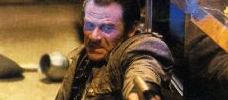
Trancers
1985 -

The Time Machine
1960 -

Groundhog Day
1993 -

Warlock
1989 -

The Navigator
1988 -
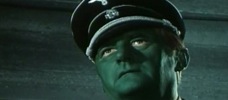
Tomorrow I’ll Wake Up and Scald Myself with Tea
1977 -

The Spirit of ‘76
1990 -

Flight of the Navigator
1986 -
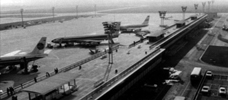
La jetée
1962 -

Twelve Monkeys
1995 -

Beastmaster 2: Through the Portal of Time
1991 -
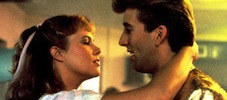
Peggy Sue Got Married
1986 -
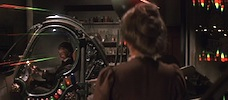
Time After Time
1979 -

Somewhere in Time
1980 -

Back to the Future
1985 -

Back to the Future Part II
1989 -

Back to the Future Part III
1990 -
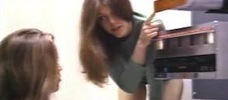
Idaho Transfer
1973 -
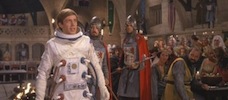
Unidentified Flying Oddball
1979 -

Slaughterhouse-Five
1972 -

The Lake House
2006 -

Time Bandits
1981 -

Doctor Who
1963–present -

Doctor Who
1963–present
We don’t do comments anymore, but you may contact us here or find us on Twitter or Facebook.



